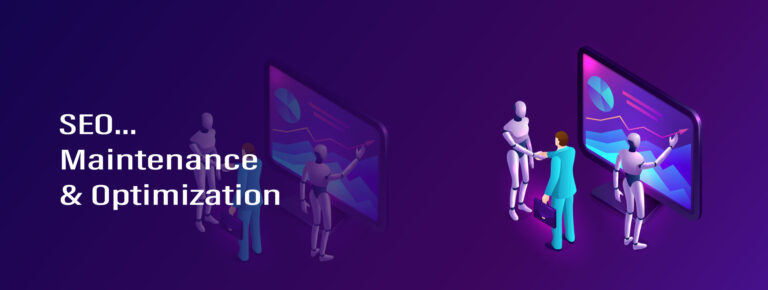As a business owner, you understand the importance of an effective digital marketing strategy to drive traffic and conversions. A key component of any successful strategy is search engine optimization or SEO. While initial SEO implementation and optimization are critical to improving your search rankings and visibility, the work does not stop there. Ongoing SEO maintenance and efforts are required to maintain and build upon your success. If you neglect your SEO strategy after the initial launch, you risk losing ground to competitors, dropping in search rankings, and missing out on new opportunities to reach potential customers. By committing to consistent SEO maintenance and optimization, you can strengthen your presence, authority, and relevance in the eyes of search engines and users. The rewards of your diligence will be ongoing increases in organic traffic and revenue.
Keyword Research: The Foundation of SEO Maintenance
To maintain an effective SEO strategy, ongoing keyword research is essential. As search trends evolve and new keywords emerge, you must stay on top of the terms and phrases your target audience uses.
Regular keyword research helps uncover new opportunities and ensure you optimize for the best possible keywords. You should aim to conduct keyword research:
- When launching a new product, service, or content initiative,. Identifying the keywords your audience will use to search for the new offering is key to optimizing for search.
- Quarterly or biannually as an audit of your current keyword targeting. Search trends change over time, so a periodic check-in is important. You may find that some of your targeted keywords have dropped in search volume while new, related terms have emerged.
- Whenever there are changes to your business, industry, or target audience that could impact the most relevant search terms. Staying on top of trends in your market and areas of interest to your customers will allow you to adapt your keyword targeting accordingly.
By prioritizing ongoing keyword research, you can feel confident that you are optimizing your SEO strategy for the terms and phrases that will drive the most valuable traffic to your website. Staying up-to-date with search trends and your audience’s needs is worth investing time and resources. Regular research will reward you with higher rankings, more traffic, and greater ROI from your SEO efforts.
Optimizing Your Content and Building High-Quality Backlinks
To maintain and improve your search engine optimization (SEO), you must continually optimize your content and build high-quality backlinks.
- Focus on creating informative, keyword-rich content. Use your target keywords in page titles, headers, and content. Provide value to readers by educating them on your topic. Update and improve existing content over time to keep it relevant.
- Build internal links between your content. Link to other relevant content on your site. This helps search engines crawl your site and reinforces the relevance of pages to each other.
- Gain high-quality backlinks from authoritative sites. Comment on industry blogs, do guest blogging and reach out to sites that may be interested in linking to your content. Focus on earning links from sites with a high domain authority that are relevant to your industry.
- Monitor your search rankings and make changes as needed. Track how your site ranks for target keywords and phrases. If rankings drop, review your content and backlinks to determine needed optimizations. You may need to create new content, improve existing content, build additional links, or fix any technical issues.
You can achieve and maintain a strong search presence by continually optimizing your on-page content and off-page backlinks. An SEO strategy is an ongoing process that requires monitoring and adjustments to keep your site at the top of search results. With regular maintenance and optimization, you can build authority in your industry and become a trusted resource for your audience.
Technical SEO Audits: Fixing Issues and Improving Your Rankings
To maintain and improve your search engine optimization (SEO), ongoing technical SEO audits are essential. Regular audits of your website allow you to find and fix issues hindering your rankings and traffic.
Check for Broken Links and Redirects
Broken links and improper redirects can negatively impact your SEO and user experience. Use a link checker tool to find and fix any broken links. Ensure all your redirects are properly configured to pass link equity to the correct pages.
Optimize Page Load Times
Fast page load times are important for both SEO and user experience. Use a tool like Google’s PageSpeed Insights to analyze your page load times and get recommendations for improvements. Things like compressing images, minifying CSS and JS files, and caching static content can help optimize your page speed.
Improve Your Site Architecture
An intuitive site architecture with a clear content hierarchy and URL structure is important for SEO. Review your site to ensure content is organized in a logical way with appropriate use of headings. Use keywords in your page URLs and avoid duplicate content across pages.
Fix Any Technical SEO Issues
Use a technical SEO audit tool to uncover other issues like duplicate meta descriptions, missing alt text, improper use of headings, and more. Fix any issues found to ensure your site is technically optimized for search engines and accessible for all users.
Conducting regular technical SEO audits and optimizing your site will help you gain greater visibility in search results. By fixing issues and improving page load times, site architecture, and other technical elements, you can boost your rankings and increase organic traffic to your website. Staying on top of technical SEO best practices is key to long term success.
Leveraging Google Analytics to Track SEO Progress
To effectively track your SEO progress and make data-driven optimizations, leverage Google Analytics. This free tool provides insights into how people find and interact with your website.
Monitor Keyword Rankings
Check which keywords are driving the most traffic to your site. See if target keywords have improved in ranking and search impression share over time. This helps determine if SEO efforts are paying off or if you need to adjust your keyword strategy.
Analyze Traffic Sources
See how visitors are finding your site, whether through organic search, social media, referrals or other channels. Make sure a significant portion of traffic is coming from organic search, and work to increase this over time through SEO.
Identify Top Performing Content
Find which content is resonating most with your audience. See which blog posts, product pages or service descriptions are receiving the most traffic and engagement. This indicates the topics and content types you should focus on creating more of. You may also want to optimize existing high-performing content to improve its search ranking.
Track Goal Conversions
Set up goals in Google Analytics to monitor how many visitors complete desired actions, such as contacting your business, signing up for a newsletter or making a purchase. Improving search ranking and traffic means little without conversions. See if SEO efforts are positively impacting your key metrics.
Continue Optimizing
Use Google Analytics data to make informed decisions about improving your SEO and overall digital marketing strategy. You may need to adjust keyword targets, improve underperforming content, fix technical issues or build more high-quality backlinks. Ongoing optimization and maintenance is key to achieving and sustaining long-term search success.
Regularly analyzing Google Analytics gives you actionable insights to refine and strengthen your SEO. Leverage these insights to make data-driven decisions that will move the needle on your search optimization efforts. Consistently monitoring key metrics and making incremental improvements over time is essential to progress.
Staying Up-to-Date With SEO Trends and Algorithm Changes
To maintain high search engine rankings, it is crucial for businesses to stay up-to-date with the latest SEO trends and algorithm changes. SEO is an ever-evolving field, and failing to optimize your website and content for the current best practices can cause your rankings to drop over time.
Monitor SEO News and Resources
Stay on top of announcements from search engines like Google regarding algorithm updates or other changes that could impact rankings. Some recommended resources include:
- Moz Blog – Moz is a leader in SEO and their blog posts breaking news and insights.
- Search Engine Journal – A reputable industry blog covering news, strategies, and trends.
- Google Webmaster Blog – Get news directly from Google about updates to their search algorithm and indexing processes.
Review Your Keywords and Content
As search trends change, the keywords and content that were once effective for your site may become less relevant. Review your target keywords and existing content on a regular basis to ensure they are still aligned with what your potential customers are searching for. Make changes as needed to use the latest terminology.
Technical SEO Audits
Technical issues like broken links, slow page load times, and duplicate content can hurt your rankings over time. Conduct regular technical SEO audits of your site to detect any issues and make fixes to optimize site health, security, and performance. Some areas to check include:
- Page load speed – Use tools like Google PageSpeed Insights and GTmetrix to check for slow pages.
- Broken links – Crawl your site to find and fix any broken internal or external links.
- Duplicate content – Look for any duplicate or thin content and consolidate or remove as needed.
- Mobile-friendliness – Ensure your site is optimized for mobile devices since Google ranks mobile-friendly sites higher.
Staying up-to-date with SEO trends and maintaining an optimized website is an ongoing process. But by monitoring news, reviewing your content, and performing regular technical audits, you can make incremental improvements over time to build a search engine-friendly site.
Conclusion
As you have seen, SEO is not a set-it-and-forget-it tactic. To achieve and maintain high search rankings, you must prioritize SEO. Consistently optimizing your content, building high-quality backlinks, and monitoring your key metrics and rankings will help ensure your site remains visible and attracts new visitors. While SEO requires time and resources, the rewards of higher traffic, more leads, and increased brand awareness make it well worth the effort. You can achieve sustainable success and growth by making SEO maintenance and optimization a habitual part of your digital marketing strategy. Staying on top of the latest best practices and trends will help your business thrive both now and well into the future.



































